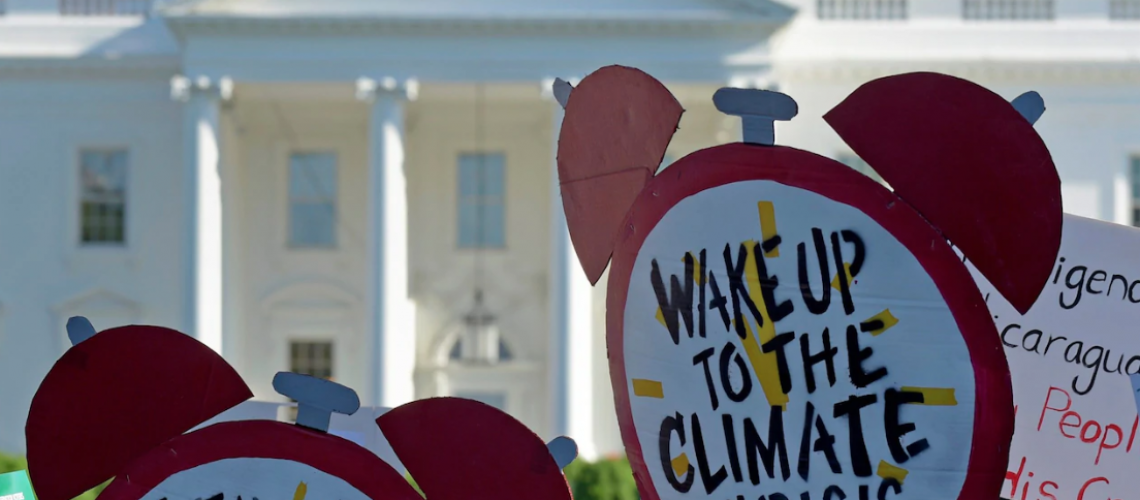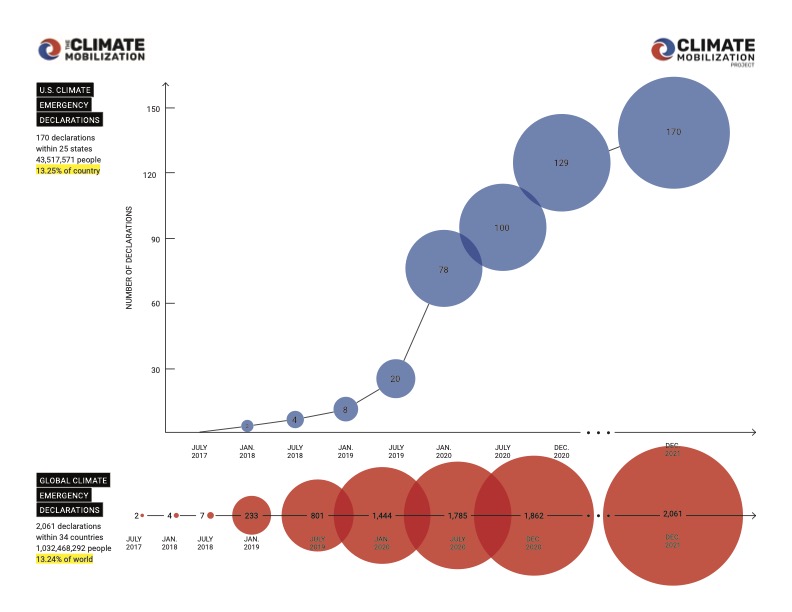11,000+ Scientists Declare Climate Emergency
The scientific community is sounding the alarm, with a group of over 11,000 scientists from 153 countries banding together to publish a paper in the journal BioScience stating ““We declare clearly and unequivocally that planet Earth is facing a climate emergency.” Citing their moral obligation to speak up, the scientists warn of “untold suffering due to the climate crisis” and convey their thinking with precise data collected over 40 years that brought them to their conclusion. Click the graphs to the right to read the full paper.
The paper calls for massive changes across all sectors of society to combat the crisis, and underscores the possibilities for “greater human well-being” inherent in a just transition away from fossil fuels.
The Washington Post linked this statement to our Climate Emergency Campaign efforts:
The term “climate emergency” has been championed by climate activists and pro-climate action politicians seeking to add a sense of urgency to the way we respond to what is a long-term problem. The Climate Mobilization, an advocacy group, is seeking to have governments in the United States and elsewhere declare a climate emergency and enact response measures commensurate with such a declaration … To date, scientists have been reluctant to use such language. However, this study may change that.”

Declaration Update
The hard work of local Climate Emergency organizers paid off in Ann Arbor, Michigan, where city counselors voted unanimously to declare Climate Emergency on November 4. The measure calls on Ann Arbor to achieve carbon neutrality by 2030, in alignment with our demands.
Since January 1, 2019, there has been a 404% increase in the number of governments that have declared a Climate Emergency. Last month Malta became the eighth national government to declare, joining the UK, Republic of Ireland, Portugal, Canada, Argentina, Spain, and Austria. This data is being tracked here, please feel welcome to share it.
Some cities that have already declared are beginning to mobilize. Berkeley’s ban on natural gas in new construction is proliferating — 13 cities in California have passed similar measures, including San José, which passed a strong Climate Emergency declaration in September and is now working to live up to it.
Local action is desperately needed, as the national governments are failing to act or moving backward. On November 4, the Trump administration announced it will begin the yearlong process of withdrawing from the Paris Climate Accord — an effort to keep warming within a still-deadly and unacceptable 2 degrees. (Check out The Climate Mobilization’s Communication Director Malik Russell commenting on the withdrawal in The New York Times.)

In better news, Canadian voters endorsed climate change action in that country’s national elections last month; after the election, two-thirds of Members of Parliament support a carbon tax.
Climate Chaos in California
California has been burning and without power. Last week the Kincaid fire spread to more than 77,000 acres (close to twice the size of San Francisco), forcing the evacuation of 200,000 people. A ring of fires now dot the outskirts of Los Angeles, forcing more evacuations and threatening homes. Many of these fires were caused by wind damage to electrical equipment — despite a “Public Safety Planned Shutoff” by Northern California’s major utility company, PG&E, that shut off power to nearly 3 million people for days at a time.

For millions of people in California the chaos, uncertainty, and physical danger of the climate crisis made itself painfully clear this month. Higher global temperatures produce drier, hotter weather punctuated by more intense rainfall — leading to increased plant growth that becomes dense fuel each autumn.
Housing policies have pushed population growth in the fire-vulnerable wildlife urban interface, and a profit-driven, privately owned power company has failed to make the necessary infrastructure improvements to keep Californians safe.
California’s wildfires show us what states can and must do to radically alter how people live with an already-altered natural environment. Among these concrete steps — detailed in the Climate Mobilization’s Victory Plan — is the development of a “SuperSmart Grid” that uses decentralized, solar-based power generation to maintain highly resilient, flexible sources of energy, with zero carbon emissions. Advanced renewable energy microgrids onsite at critical facilities are a straightforward step to providing some resilience in the face of continued power shut offs and fires.
Taking on Fossil Fuel Extractors in Court
Cities and states throughout the U.S. are bringing lawsuits against oil, gas, and coal companies, arguing that the companies’ extraction, promotion, and sale of fossil fuels has led to rising sea levels, increased flooding, and more frequent extreme weather events — thereby creating a public nuisance. Litigating these cases means revealing how fossil fuel companies have lied to the public and going after companies that are still expanding drilling, endangering us all.
The U.S. Supreme Court delivered a significant victory to the latest campaign of public nuisance suits in October, rejecting an appeal from oil companies and allowing the cases to proceed. Coastal cities like Baltimore and states like Rhode Island will now have a chance to demand documents, present evidence, and seek remedies for the damages they are already suffering as a result of climate change.
Along with legal action, this year’s presidential primary campaign has seen a broader shift among national politicians in the U.S. placing blame for climate chaos with the fossil fuel companies and demanding that climate action begin with a ban on new production.
If you’re interested in learning more about lawsuits aimed at remediating the effects of, or demanding a stop to, carbon production, the Sabin Center for Climate Change Law maintains an incredible online resource for tracking climate change litigation in the U.S. and internationally.
Parenting in an Emergency
For parents, living with climate truth brings particular heartbreak and challenges. As Climate Mobilization Project board member Shuo Peskoe-Yang put it recently in an interview with NPR, “the future as it has been promised to [us], is not what that will be” for our children. The interview covers ways to minimize the trauma children experience while making clear the stakes and empowering them to act.
Researchers recommend talking openly about climate, cultivating a love of nature (even if only in the local park), and encouraging and supporting children as they engage directly in activism with parents or peers.
In Italy this week the government voted to take on the work of those conversations in schools, making a climate change and sustainability curriculum mandatory in all grades.

Greta beetle
Finally, on a lighter note — entomologists have named a new beetle species after Greta Thunberg. The researcher who identified and classified the Nelloptodes gretae from a sample at London’s Natural History Museum chose the name to honor the climate activist and her campaign to save planetary biodiversity — and human life — from climate catastrophe.
Thank you for your interest and commitment to this work! Visit our webpage to find out how you can join the movement to protect humanity and the natural world from climate breakdown.


















